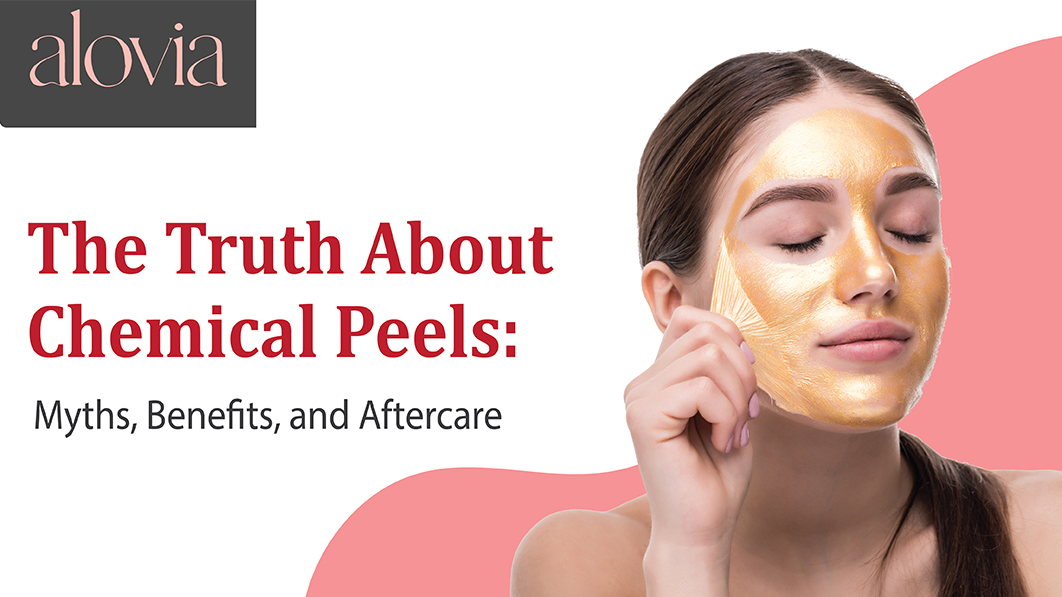 Dec 20, 2023
Dec 20, 2023
Chemical peels, a popular skincare treatment, often come shrouded in myths and misconceptions. This treatment, designed to rejuvenate and refresh the skin, has become a cornerstone in aesthetic skincare.
Yet, many remain hesitant, influenced by prevalent myths. Let's demystify chemical peels, exploring their true benefits and the essential aftercare steps.
Understanding Chemical Peels
A chemical peel involves applying a chemical solution to the skin, which exfoliates and eventually peels off. This process reveals a smoother, more youthful layer of skin beneath. Peels range from superficial to deep, targeting various skin concerns, including acne scars, ageing signs, and uneven skin tone.
Debunking Common Myths
Myth 1: Chemical Peels Are Extremely Painful Contrary to popular belief, chemical peels are not inherently painful. Mild tingling or warmth can be expected, but advancements in formulations ensure a comfortable experience.
Myth 2: They Are Only for Severe Skin Issues Chemical peels cater to a broad spectrum of skin concerns, not just severe cases. They are equally effective for minor imperfections and preventative care.
Myth 3: Peels Thin the Skin Regular, professionally administered peels do not thin the skin. Instead, they remove dead skin layers, promoting healthy skin regeneration.
The Benefits Unveiled
Chemical peels offer a plethora of benefits:
Improved Texture and Tone: They effectively reduce fine lines, scars, and hyperpigmentation, leading to an even skin tone.
Acne and Oil Control: Certain peels can deeply cleanse pores, reducing acne and controlling oil production.
Enhanced Skin Health: By removing dead skin cells, peels improve overall skin health, allowing better absorption of skincare products.
Aftercare: Ensuring Optimal Results
Post-peel care is crucial for maximising benefits and minimising risks. Here are key aftercare tips:
Sun Protection: The skin becomes more sensitive post-peel. Use a broad-spectrum sunscreen to protect against UV damage.
Gentle Skincare: Opt for mild, non-irritating skincare products. Avoid exfoliating agents immediately after a peel.
Hydration is Key: Keep the skin well-hydrated to aid in the healing process.
Avoid Picking: Let the skin naturally peel off to prevent scarring.
Who Should Consider a Chemical Peel?
Chemical peels are suitable for most skin types. However, consultation with a skincare professional is essential, especially for those with sensitive skin or specific skin conditions.
Chemical peels, far from the myths surrounding them, are a safe and effective way to rejuvenate the skin. They offer a solution for various skin concerns, with manageable aftercare. Remember, professional guidance is paramount to ensure suitability and effectiveness.
If you're considering a chemical peel or seeking personalised skincare advice, Alovia Clinics offers expert consultations and treatments tailored to your unique skin needs. Embark on your journey to radiant, healthy skin with us today.
Feb 28, 2024Laser Hair Removal vs. Traditional Methods: Which is Right for You?
Jan 23, 2024The Allure of Laser Hair Removal: A Modern Solution for Unwanted Hair
Dec 20, 2023The Truth About Chemical Peels: Myths, Benefits, and Aftercare
Nov 22, 2023Nourishing Your Skin and Hair: The Rich Tapestry of the Indian Diet
Oct 19, 2023The Impact of Diet on Skin and Hair Health
Sep 14, 2023The Science of Platelet-Rich Plasma (PRP) Therapy for Hair Growth
Aug 26, 2023Understanding the Different Types of Acne and Effective Treatment Options


No: 31, First Floor, 29-28-1, D.No, Kovelamudivari Street, Suryaraopeta, Vijayawada, Andhra Pradesh 520 002.
All Rights Reserved | Website Designed & Developed By Glint Creatives